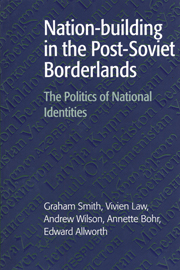Book contents
- Frontmatter
- Contents
- List of figures
- List of tables
- Preface
- The post-Soviet borderland states
- 1 Post-colonialism and borderland identities
- Part I Rediscovering national histories
- Part II Ethnopolitics and the construction of group boundaries
- Part III Language and nation-building
- 8 Language myths and the discourse of nation-building in Georgia
- 9 Language policy and ethnic relations in Uzbekistan
- Notes
- Index
8 - Language myths and the discourse of nation-building in Georgia
Published online by Cambridge University Press: 01 June 2011
- Frontmatter
- Contents
- List of figures
- List of tables
- Preface
- The post-Soviet borderland states
- 1 Post-colonialism and borderland identities
- Part I Rediscovering national histories
- Part II Ethnopolitics and the construction of group boundaries
- Part III Language and nation-building
- 8 Language myths and the discourse of nation-building in Georgia
- 9 Language policy and ethnic relations in Uzbekistan
- Notes
- Index
Summary
Language issues have played a large part in the nationalist discourse and in the shaping of new and transformed national identities in the post-Soviet states: witness the requirement to learn Estonian built into the citizenship legislation of Estonia and the return to the Latin script in the Central Asian states. Cases such as these could be subsumed under the heading of language planning, whether in the form of attempts to purge the language of foreign elements or of legislation on language use. No less significant is what has been described as the ‘impromptu linguistics’ of politicians and civil servants. Although the tenets of this form of linguistics bear only a passing resemblance to those of contemporary linguistic scholarship, their consequences are vastly more significant than those of the beliefs held by linguistics professionals. Implicitly or explicitly, they underlie irredentism, ethnic conflict, mass migration and ethnic cleansing, and the redrawing of national and regional boundaries. A key element in such politicised linguistics and the discourse of nation-building in many of the post-Soviet states is myths about language. Since the publication of Anthony D. Smith's The Ethnic Revival (1981) and Benedict Anderson's Imagined Communities (1983), to name but two of the most distinguished contributions to the subject, the importance of myth, belief and self-image in the formation of group identity has been acknowledged to be a crucial factor in the emergence of many nationalisms.
- Type
- Chapter
- Information
- Nation-building in the Post-Soviet BorderlandsThe Politics of National Identities, pp. 167 - 196Publisher: Cambridge University PressPrint publication year: 1998

